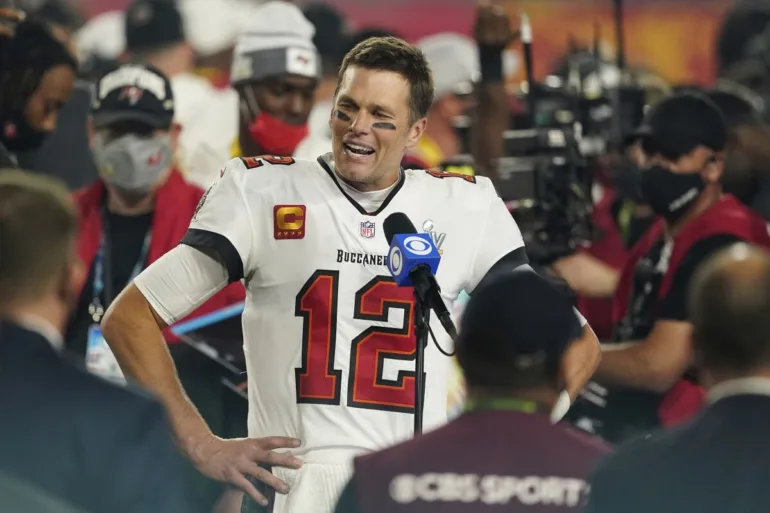TL;DR:
- Tom Brady is facing a legal challenge over the creation of a fake comedy special featuring his likeness generated by AI without his permission.
- Comedians Will Sasso and Chad Kultgen received a cease-and-desist letter from Brady’s lawyers alleging misappropriation of the former quarterback’s name, voice, persona, and likeness to advertise and promote their podcast and Patreon page.
- The lawsuit also claims that the duo presented Brady in a false light, and there may be possible defamation and copyright infringement.
- Sasso and Kultgen removed the video but emphasized that it was only an impersonation of Brady and clearly stated a simulated version of what would happen if Brady did comedy.
- The incident involving Tom Brady has been resolved, but it highlights the potential for legal trouble in the future with the use of AI technology.
- AI-generated lawsuits are a new frontier in intellectual property disputes, with most cases revolving around violations of copyright law.
- The recent case involving Tom Brady highlights the growing concern about the illegal use of a celebrity’s likeness with the help of AI technology.
- The entertainment and sports industries, along with the legal community, will closely monitor the developments in AI-generated lawsuits and their impact on intellectual property rights.
Main AI News:
The Football Legend Tom Brady Finds Himself in a Legal Quandary Over an AI-Generated Comedy Special
Tom Brady, the former NFL quarterback and soon-to-be lead broadcast analyst for Fox Sports, is facing a legal challenge over the creation of a fake comedy special featuring his likeness, which was generated using artificial intelligence without his permission.
Comedians Will Sasso and Chad Kultgen, hosts of the popular podcast “Dudesy,” received a cease-and-desist letter from Brady’s lawyers following the release of an hour-long video that used an AI-generated photo of the football legend in a stand-up comedy show.
The lawsuit, which was filed by Brady’s legal team, alleges that Sasso and Kultgen misappropriated the former quarterback’s name, voice, persona, and likeness to advertise and promote their podcast and Patreon page. The lawsuit also claims that the duo presented Brady in a false light and that there may be possible defamation and copyright infringement.
In a recent YouTube episode, Sasso and Kultgen broke down the details of the lawsuit and stated that they had removed the video but emphasized that it was only an impersonation of Brady and that the video clearly stated it was a simulated version of what would happen if Brady did comedy.
Chad Kultgen explained, “It’s exactly like what you would see if you watch any stand-up comedy special or sketch comedy show where they’re doing impersonations of people. I don’t think we’re in any way presenting Mr. Brady at all. It’s simply a parody of the idea of Tom Brady doing stand-up.”
Tom Brady retired from the NFL in February after 23 successful seasons, but his likeness and reputation are still very much in the public eye, as evidenced by this recent legal wrangling. The outcome of this case will be watched closely by the entertainment and sports industries alike, as it has the potential to set an important precedent for the use of AI-generated likenesses in the future.
The Emergence of AI-Generated Lawsuits: A New Frontier in Intellectual Property Disputes
As artificial intelligence becomes increasingly accessible and mainstream, lawsuits involving AI-generated video and images have begun to emerge with greater frequency. The majority of these cases revolve around violations of copyright law, where AI tools are used to create content by scraping art from the Internet without the permission of the artists.
However, the recent case involving Tom Brady highlights a growing concern in the realm of AI lawsuits – the illegal use of a celebrity’s likeness with the help of AI technology. Celebrity likeness lawsuits are not new, even prior to the advent of AI. For instance, Bette Midler sued Ford Motor Co. in 1988 over the unauthorized use of her singing voice in a commercial, while Kareem Abdul-Jabbar sued General Motors in 1996 over a comparison of one of its cars to his former name, Lew Alcindor. Actors George Wendt and John Ratzenberger, famous for their roles as Norm and Cliff on the television show “Cheers,” sued Host International after the company built robots that closely resembled them at airports.
The incident involving Tom Brady has been resolved, with the video in question being taken down. However, it serves as a reminder of the potential for further legal trouble in the future as the use of AI technology continues to grow and evolve. The entertainment and sports industries, along with the legal community, will closely monitor the developments in AI-generated lawsuits and their impact on intellectual property rights.
Conlcusion:
The recent legal challenge faced by Tom Brady highlights the growing concern surrounding AI-generated lawsuits and the potential for violation of intellectual property rights. The entertainment and sports industries, as well as the legal community, will closely monitor the developments in this area and their impact on the market.
The rise of AI-generated lawsuits, particularly those involving the illegal use of a celebrity’s likeness, is a new frontier in intellectual property disputes and highlights the need for clear and defined regulations to protect individuals and companies from potential legal trouble. As AI technology continues to grow and evolve, it is crucial that these regulations are put in place to ensure that the industry remains protected and continues to thrive.

